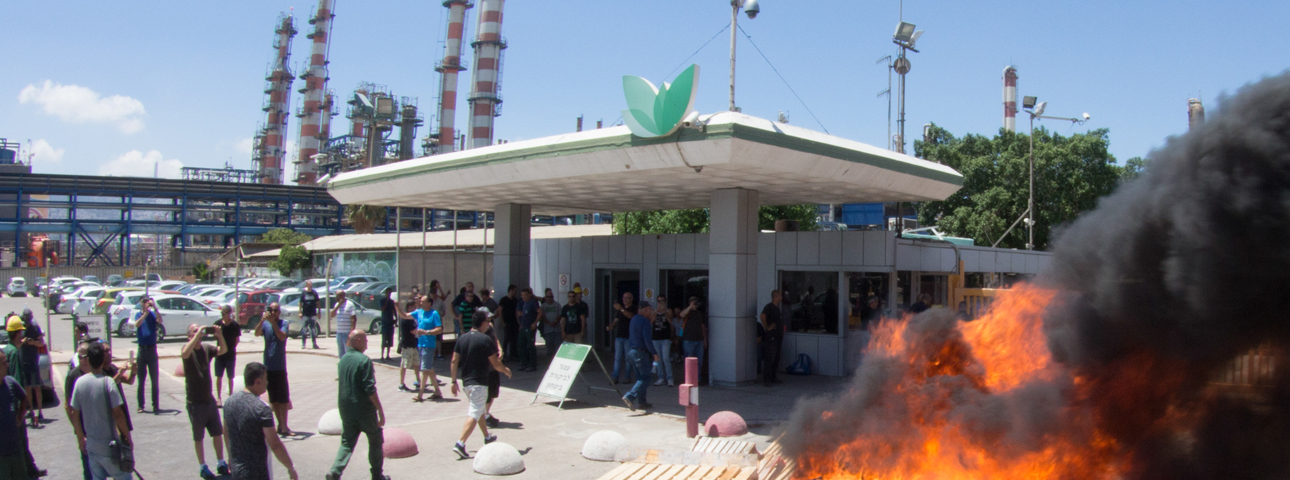Active Labor Market Policy Must Become Priority
For Israel's economy to grow, significant investment in building a strong and effective infrastructure for occupational training and reemployment is critical.

Haifa Chemicals announced today that it would be closing its operations and will lay off 1,500 employees as part of a plan to replace some of its local production with imports of ammonia from overseas. This development is the latest in a series of plant closures and subsequent layoffs, including the recent decisions of both Sugat and Visconic to shut their plants that employ 450 workers.
These factory closures stem from a trend of increasing reliance on international markets. Sugat’s management came to the conclusion that it is now cheaper to import sugar from Brazil and Europe than to produce it in Israel. And the Visonic shutdown followed a decision to relocate its factory to China.
These cases highlight a major challenge to the Israeli economy. While Visconic is transferring its production line to China, it will still leave in Israel its research and development center, which employs highly skilled workers such as engineers and programmers. At the same time, lower-skilled workers are facing harsh competition from overseas, including from countries where labor costs are significantly lower. Computerized manufacturing processes are expected to further exacerbate the threat to the job security of many Israelis.
Globalization and automation are challenges that have significant implications for all advanced economies. Yet Israel faces a serious deficiency that makes these challenges particularly severe: it lacks of an effective “second chance” infrastructure, i.e. one that provides job-seekers with opportunities for finding new jobs.
Broadly speaking, there are two main approaches to dealing with layoffs and unemployment: a “passive” policy, which consists of providing the jobless with a safety net (such as unemployment insurance), and an “active labor market policy” (or ALMP), which consists of measures aimed at returning workers to the labor force. These active measures include occupational training programs, assistance in jobs searches, or subsidies for employers that hire the unemployed. In recent decades, the active approach has become a central element of the labor market policies of many countries. However, Israel is lagging far behind in this respect. Its investment in ALMP remains below 0.2% of GDP, less than a third of the OECD average, and less than a fifth of the investment made by countries such as the Netherlands, Belgium, and Denmark.
If in the past there were doubts about the effectiveness of active labor market policies, a range of empirical studies published in recent years provide convincing evidence as to their usefulness. Some still justify Israel’s meagre investment in ALMP by arguing that the specific training programs used in Israel are ineffective. But even that claim is weak and refuted by the promising findings of a recent experimental study that examined the effectiveness of the “Employment Circles” training program administered by Israel’s Employment Service.
Yet even if the study’s findings were less impressive, it is crucially important to recognize that an effective active labor market policy is largely the result of “learning by doing”. Only a sustained process of trial and error, including the use of diverse training and support methods, and an ongoing, systematic evaluation of results, will enable the relevant parties to improve and get the most out of Israel's active labor market policy.
Beyond these arguments, the opposition to increased investment in an active labor market policy stems from a narrow view of its contribution to the economy. Naturally, Finance Ministry officials focus on the cost of training an employee relative to the potential savings it provides (e.g. through decreased outlays on unemployment benefits). But that is a mistake, as it ignores the fact that workers’ fears about having weak re-employment prospects if they were to lose their jobs, have far reaching consequences for the entire economy.
When workers feel that their chances of finding alternative employment with a similar income are low, they are far more willing to take extreme measures to thwart any initiative that could threaten their livelihood. This willingness then creates tremendous pressure on the labor unions to fight every reform that has potential implications of layoffs, even in cases where the necessity of the reforms is beyond doubt.
Hence, significant investment in building a strong and effective infrastructure for occupational training and reemployment is critical. Not only will it provide much needed help to laid off workers such as those in Haifa Chemicals, Sugat ot Visonic. Investment in a strong ALMP infrastructure will also contribute to a significant improvement of labor relations and to the government’s ability to pursue widely needed reforms that would benefit the economy as a whole.
The author is a Senior Research Fellow at the Israel Democracy Institute and a Professor of Political Economy at Tel Aviv University
This piece was first published in the Jerusalem Post.
